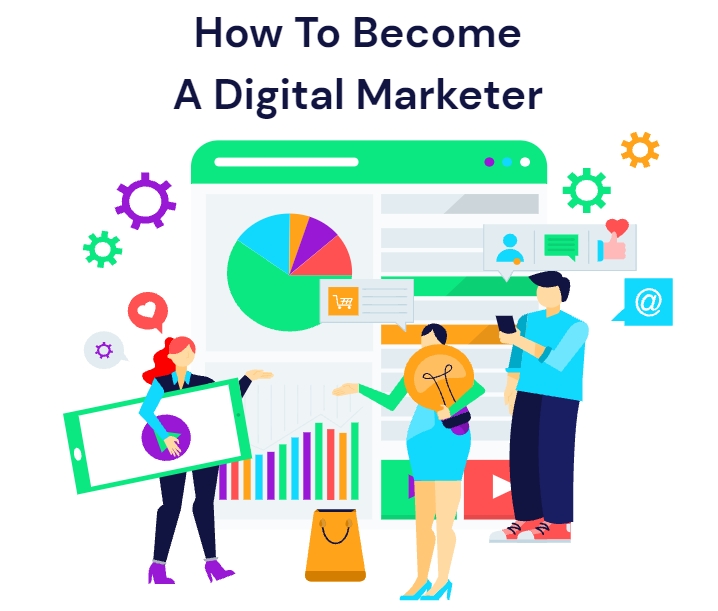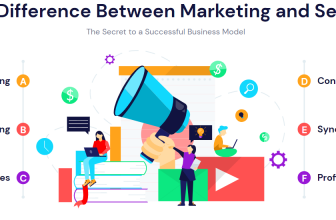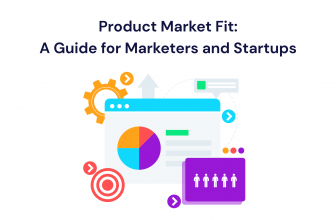
Digital marketing is a field that includes many different strategies to help promote business and services online.
Becoming a digital marketer is not like becoming a graphic designer or web developer.
Digital marketing involves creating and promoting your website or mobile applications, as well as managing online promotions.

Becoming a digital marketer could be one of the most valuable opportunities of your career.
You may be able to join a marketing agency, work in the in-house marketing department of a company, become a consultant, or work as a freelancer.
Learn common skills and main directions, and why you should become a digital marketer.
I have been in the field for more than ten years now, and I can tell you with complete certainty: the best way to learn is to get started!
The best way to start when it comes to digital marketing is to first build your knowledge about the main principles of marketing and how they apply to digital marketing.
It would be best if you understood how principles work in digital marketing.
It’s essential to understand the fundamentals of digital marketing.
This means that you need to learn how to create a marketing strategy, promote it, with which tools to do it, measure its success, and most importantly, adapt your marketing to your business or company.
You must discover how works websites, the basics of search engine optimization, paid traffic, analytics, social media, email marketing, and marketing automation.
To be more precise, you have to learn what are your target customers, what they want, how they interact with each other, what content they share, what are the main channels you can use to reach them, how to analyze their behavior, and what is the ideal way to present your products or services.
When you start learning the fundamentals of digital marketing, it is essential to participate in online courses.
The courses provide you with practical tips about digital marketing.
They help you gain more knowledge about different tools, strategies, methods, and techniques.
I recommend signing up for free training programs from various digital marketing agencies if you are a beginner.
Some companies may offer their training programs. For example, Google offers several free online courses like Think with Google or Skillshop.
Once you’ve learned the basics and understand how digital marketing works, you should decide on your future specialty.
In digital marketing, I highlight the main specialties such as:
- SEO Specialist
- PPC Specialist
- Email / Retention Specialist
- SMM Specialist
- PR Specialist
You can become an expert in any one of these areas. Let’s look at what each specialist does and how they fit into the bigger picture.
SEO – Search Engine Optimization. It would be best to get the search engines to notice that your site has something new and interesting to offer, and you would like to rank it accordingly to get more visitors and people to visit your site.
SEO specialists work on your web pages and ensure they are optimized according to your target audience.
They do keyword research to find out what your keywords are and how many times you use them.
They analyze competitor websites to identify their strengths and weaknesses and how they can beat them.
They work with search engine optimization tools to optimize your web pages, prepare assignments for copywriters to write unique content, and keep track of rankings.
They also write meta tags, descriptions, and titles for web pages.
In short, an SEO specialist is responsible for optimizing the website to get noticed by search engines.
PPC – Pay Per Click advertising. PPC is the process of paying the price to place a banner or text ad on a website or in a search engine.
PPC specialist needs to be familiar with Google Ads, Bing Ads, Facebook Ads, and many other paid tools.
PPC specialist decide which keywords are most valuable and where your advertisements should be placed.
They have to decide on the budget and time frame of the campaign.
They optimize landing pages and content to get the best results in conversions.
Also, they make sure all of the ads deliver the right message and adjust as needed.
In short, they create paid marketing campaigns that drive sales.
Email specialists are responsible for promoting business via emails.
Email specialists also need to have excellent knowledge about how email marketing works, how people interact with it and segment the target audience.
It’s essential for them to understand how email marketing works from both the sender and recipient perspective.
They design emails and prepare them to be sent out according to the audience.
They write copy for emails, make sure subject lines are relevant and clear, and ensure the email’s layout is appealing.
Retention specialists are in charge of keeping customers engaged with the business.
This includes: offering them incentives, making offers, keeping up with their interests, answering questions, and finding new ways to retain them.
Retention specialists have to be very familiar with CRM, which is a Customer Relationship Management system.
This is a tool that helps companies track and manage customer interactions.
In short, Email / Retention specialist keep in touch with current and potential customers, and they build and nurture long-term relationships.
SMM – Social Media Marketing. It is an excellent way to communicate with the audience and share valuable information.
Social media specialists create content for different social networks like Facebook, Twitter, LinkedIn, TikTok, Instagram, Pinterest, etc. They create content in videos, articles, photos, polls, quotes, and other types of content.
Also, they must know how to interact with other users through social media, like liking, sharing, commenting on their posts, replying to them, liking and retweeting their tweets, announcing events, promoting products, and raising awareness about the business.
In short, SMM specialists create and post social media content and build connections and engage audiences.
PR – Public relations is the process of getting a brand in the public eye.
The objective is to create a positive image, make the company known to the public, and get people talking about the company.
PR Specialist is responsible for all the marketing related to press releases, promoting the company’s products or services, and creating and distributing information helpful to the target audience.
This includes everything from press releases, interviews, and articles in magazines, newspapers, and blogs.
They also keep track of the media coverage and what people are saying about the business.
They are often the first point of contact for the media and need to answer questions.
In short, PR specialists make the company and its business known to the public through different communication channels.
It’s important to gain real experience and ensure you’re on the right career path.
You can do this by working with an agency that provides internship opportunities.
It is ideal to find an internship opportunity in the specialties and industry that interests you.
It’s also a great way to help your friends or relatives promote their online business or website for them for free, and it’s a great way to get started on your career.
This is a great way to discover how it works well on different platforms and which are effective.
Try to use as many various tools as you can and find one that you like best.
It will also allow you to network with people in the field and get the inside scoop.
It will help you build the first portfolio and show off your strengths. If you have good work cases, you’ll be more likely to get hired.
It will allow you to showcase your skills and abilities and prove your commitment to the job.
To sum it up, you should try to gain real experience by doing different internships and projects.
Once you’ve gained experience in the field or company you want to work in, it’s time to build a resume.
The resume is the most important part of your application as it shows your level of expertise and helps recruiters understand how they can benefit from hiring you.
It’s crucial to have a good resume because many companies hire based on the information it contains.
You must make sure it is neat, clean, and free from mistakes. It’s used as an application for a job.
The resume should include the following:
• Objective: What do you want from the job? To summarize what you want and need to do to be successful.
• Career objective: Include your career goals and your plan of action. If you’re applying for a position as an SEO specialist, for example, state that you’d like to increase website traffic.
• Education: Include your education history. This includes all the different courses you have taken, the dates they were completed, the school you attended, and the major you took in college.
• Work experience: This includes any jobs you’ve held in the past, what you did in those positions, and the dates they were held.
• Projects: Include any projects or achievements you’ve been involved in, how well they turned out and the results.
• Skills: List the skills and abilities that you possess. This includes the skills and abilities that are relevant to the job.
Once you have your resume created, create a cover letter.
A cover letter is an introduction that allows an employer to know who you are and why you want to work for them.
In the cover letter, you should address yourself to the company you want to work for.
It should not only focus on what you can do for the company but also what the company can do for you.
It should not only focus on what you can do for the company but also what the company can do for you.
As a result, the HR manager will be able to determine whether you’ll be a good fit for their company.
In summary, you must have a professional resume and cover letter to apply for a position in digital marketing.
A big part of job searching is an interview.
When you go for an interview, it’s important to research the company to be prepared.
You have gained knowledge and can talk about yourself and your skills once you’ve researched the company.
You can ask the interviewer questions if you prepare them.
You might be asked about your skills and why you would be a good fit for the position.
When talking to the employer, be polite, professional, and confident.
Even if you didn’t get the job, you should still follow up on your interview.
If you have a good relationship with contacts from the company, it’s a good idea to keep in touch with them after the interview.
They might be able to give you feedback or give you another chance to get a job.
Never stop and keep learning, self-improvement, and practice continuing education.
In an ever-changing industry, it is essential to educate and develop as a digital marketer continually.
Technology and business are constantly changing, and new methods are being developed all the time.
In order to meet the changing needs of the industry, it is vital to prioritize ongoing professional development by conducting personal research, attending workshops and seminars, networking with industry professionals, and attaining advanced education.
Moreover, you can take advantage of continuing education to improve your skills, build a more robust network, and get closer to your professional goals.
The more you learn, the more you’ll be able to offer your employer.
There are many professional online courses to help you gain valuable experience and training that you can put on your resume.
Also, never give up when you are faced with a difficult task.
Instead of giving up, try to learn from your mistakes and improve.
You may not know what you don’t know, but you can find out.
And you should keep in mind that you will never know everything, so don’t let that stop you from striving for success.
We’ve discussed the best practices and tips to apply when searching for a job in digital marketing.
The biggest thing to remember is that no matter what path you choose, you must continue developing and expanding your skillset and knowledge.
As the industry continues to grow and change, you will have the opportunity to gain experience and knowledge and improve your skills.
You need to continually improve your skills and stay up to date with new developments in digital marketing.
Never stop learning, self-improvement, and practice continuing education.
You’ll also have the opportunity to learn and network with professionals within the industry.
And finally, it’s essential to never give up on yourself or your career.
Thanks for reading!
If you have any thoughts or comments on this article, then feel free to drop me a comment.





Great post. I was checking continuously this blog and I am impressed!
Very useful info particularly the last part 🙂 I care for such info much.
I was looking for this certain information for a long time.
Thank you and good luck.